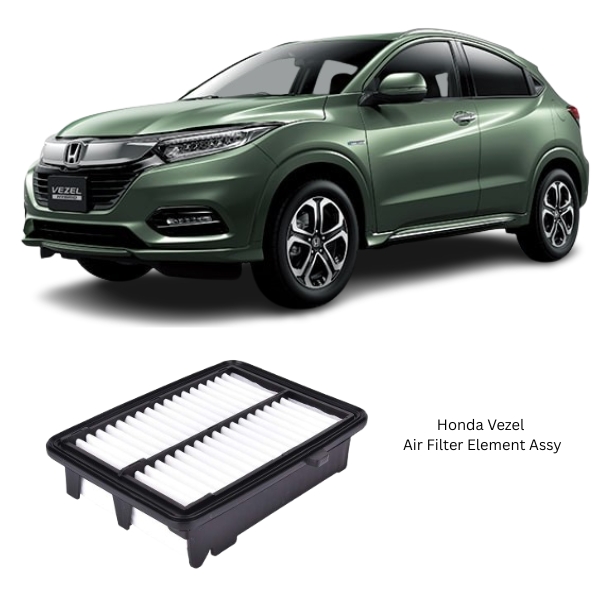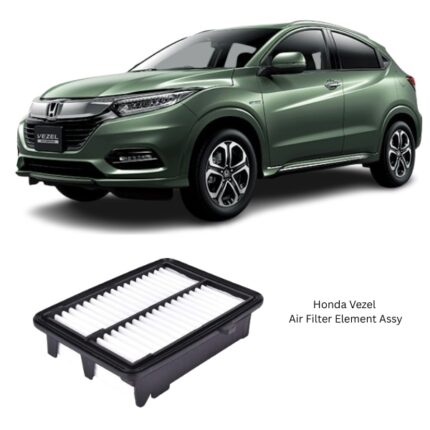Get Honda Vezel Air Filter Element Assy 17220-5R0-008 in Kenya
The air filter element assembly is an essential component within the vehicle’s air intake system, designed to deliver clean, filtered air to the engine for combustion. Often overlooked, this component plays a critical role in maintaining engine performance, efficiency, and longevity. Without an effective air filter, harmful debris, dust, and particles would enter the combustion chamber, potentially damaging engine internals and reducing vehicle performance over time.
Purpose of the Air Filter Element Assembly
The primary function of the air filter element assembly is to trap and prevent the entry of airborne contaminants such as dust, dirt, pollen, sand, and soot into the engine’s air intake manifold. Combustion engines require a precise mixture of air and fuel to operate efficiently. If the air is contaminated, the combustion process becomes inefficient, leading to reduced performance, increased fuel consumption, and higher emissions.
The air filter element ensures that the engine receives a steady flow of clean air under all operating conditions, contributing to optimal combustion, fuel economy, and emission control.
Construction and Material Composition
An air filter element is typically constructed using layers of pleated paper, synthetic fiber, or foam. The pleats increase the surface area, allowing the filter to capture more particles without restricting airflow. High-quality filters are often made with multi-layered media that can trap both large and fine particles.
The outer casing or frame is commonly made of plastic, rubber, or metal to provide structural rigidity and ensure a proper seal within the air filter housing. A rubber or silicone gasket along the edges prevents unfiltered air from bypassing the element.
There are two main types of air filters based on media:
-
Paper Filters – Cost-effective and efficient, these are made from treated cellulose. They provide excellent filtration but are typically disposable.
-
Synthetic or Foam Filters – These offer reusable options with higher flow rates and are often used in performance applications or off-road environments.
Working Principle
The operation of the air filter element is straightforward. As the engine draws air into the intake manifold, it must pass through the air filter. The filtering media traps airborne particles while allowing air molecules to pass through. Clean air continues to the intake manifold, where it mixes with fuel in a calibrated ratio before combustion occurs.
Over time, the filter traps more particles and becomes clogged, reducing airflow. A clogged filter limits engine breathing, leading to a richer fuel mixture, increased fuel consumption, and sluggish engine response. Regular maintenance and replacement are crucial to avoid such issues.
Importance to Engine Performance
The cleanliness and volume of air entering the engine significantly affect its performance. A clean air filter enables:
-
Optimal combustion – Ensuring the engine gets the correct air-fuel mixture.
-
Efficient fuel use – Prevents overconsumption due to restricted airflow.
-
Power output – Provides sufficient oxygen for combustion, maintaining engine power.
-
Longer engine life – Reduces wear and tear by keeping abrasive particles out of the engine.
-
Emission control – Helps maintain compliance with emissions standards by supporting complete combustion.
Location in the Vehicle
The air filter element is housed within the air intake box or air cleaner housing, usually located in the engine bay. It is positioned between the air intake duct and the throttle body or mass airflow sensor, depending on the engine design. The housing is designed to be easily accessible for maintenance or replacement.
Signs of a Dirty or Failing Air Filter Element
A dirty or worn-out air filter can lead to various performance issues. Signs that indicate the need for inspection or replacement include:
-
Reduced engine power or acceleration – The engine struggles to breathe due to limited airflow.
-
Increased fuel consumption – The ECU compensates for the lack of air by injecting more fuel.
-
Dark or black smoke from the exhaust – Indicates incomplete combustion due to a rich fuel mixture.
-
Check engine light – A clogged filter can cause sensor readings to fall outside expected parameters.
-
Rough idling or misfires – Poor air supply disrupts combustion balance.
-
Visual inspection – A filter that appears dark, soiled, or clogged with debris should be replaced.
Maintenance and Replacement
The replacement interval of an air filter element depends on driving conditions, vehicle usage, and manufacturer recommendations. Under normal driving conditions, it is typically recommended to replace the air filter every 15,000 to 30,000 kilometers. In dusty or off-road environments, more frequent replacement may be necessary.
To maintain the air filter:
-
Inspect regularly – Check the condition during routine servicing.
-
Replace as needed – Avoid driving with a dirty or clogged filter.
-
Use quality replacements – Ensure replacements meet OEM specifications for fit and filtration efficiency.
Some air filter assemblies, especially in performance or racing vehicles, are washable and reusable. These require proper cleaning, drying, and re-oiling (if applicable) before reuse.
Impact on Other Systems
The air filter element directly impacts other components within the engine system:
-
Mass Air Flow (MAF) Sensor – A dirty filter can allow fine dust to reach and contaminate the sensor, leading to inaccurate readings.
-
Turbochargers or Superchargers – Require clean air to function correctly. Dirty air can damage compressor blades.
-
Exhaust system and Catalytic Converter – Incomplete combustion caused by insufficient air supply can lead to carbon buildup and premature wear.
Environmental and Economic Considerations
Using a clean air filter improves fuel efficiency and reduces harmful emissions, contributing to a lower environmental impact. Reusable filters, while initially more expensive, offer long-term savings and reduce waste.
Conversely, neglecting the air filter can lead to costly engine repairs, reduced vehicle lifespan, and poor fuel economy—making regular maintenance economically wise.
Follow us on Facebook for more parts.





Reviews
Clear filtersThere are no reviews yet.